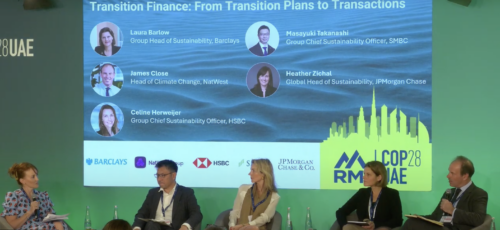
How Global Banks See Transition Finance in 2024
COP28 brought a renewed focus on transition finance. Here’s how major banks are looking at the road ahead.
Transition finance is critical to the net-zero transition, driving capital and investment towards reducing emissions in hard-to-abate sectors with credible transition plans. However, challenges to mobilizing transition finance remain, including concerns about greenwashing, lack of market standardization, and risk of carbon lock-in.
During COP28 in Dubai, RMI hosted a panel discussion on transition finance with several global banks to address these opportunities and pressing concerns. The panel, with senior sustainability representatives from Barclays, HSBC, JPMorgan Chase, NatWest, and SMBC, discussed the opportunities for and barriers to implementing transition finance, emerging strategies for mobilizing it credibly, and important next steps to overcome challenges. Here are three key takeaways from the discussion.
Working with clients to enable transition finance is critical to meet banks’ decarbonization targets.
In recent years, many banks have committed to reducing their financed emissions to net zero. Panelists highlighted the importance of a whole-portfolio approach to achieve their climate goals — with a focus on transition finance for those hard-to-abate sectors that require particular attention and investment to decarbonize, in addition to green finance for clean solutions and energy efficiency.
Enabling the transition of hard-to-abate sectors requires banks to work closely with clients to understand clients’ needs and progress on decarbonization, encourage ambitious transition plans, and help develop strategies and provide solutions for their transition, with approaches tailored by sector and region to address the unique challenges, opportunities, and context of each. This client-focused approach to transition finance is described in examples such as JP Morgan’s most recent climate report, SMBC’s Transition Finance Playbook, and NatWest’s Climate Transition Plan Engagement.
Financing new technologies is a challenge.
Many of the technologies for decarbonizing hard-to-abate sectors are new, such as green hydrogen or sustainable aviation fuel. These technologies are often seen as too risky for banks to finance on their balance sheets. There is also a need for banks to develop internal expertise on these technologies to assist with technical due diligence, better understand the technologies’ risks, and identify opportunities for clients. However, banks are exploring innovative approaches to address these challenges. Barclays has a Sustainable Impact Capital portfolio to support start-ups developing technologies to reduce emissions in hard-to-abate sectors, and HSBC recently launched Innovation Banking services and is exploring equity partnerships with asset managers to gain exposure to and support the growth of “new economy” clients.
Policy is needed to accelerate the transition.
The need for enabling policy was highlighted as a key component of facilitating credible transition finance. While banks have a critical role to play in mobilizing transition finance, action from policymakers and regulators is needed to help develop technologies and accelerate finance deployment. One enabling action mentioned during the panel was the creation of regional or national transition roadmaps to provide clarity on future priorities and investment opportunities. Roadmaps and taxonomies for both green and transition technologies are complete or underway in regions around the world, such as the ASEAN Taxonomy for Sustainable Finance, but are not currently available in all countries.
While the event delivered a rich discussion on current approaches to transition finance, it also to deploying credible transition finance – such as developing stronger guidelines and KPIs for transition finance issuance, assessing transition plan credibility, scaling nascent technologies needed to decarbonize hard-to-abate sectors, and developing region- and sector-specific decarbonization pathways.
For more:
- Video: Watch the full event on YouTube.
- Article: Defining Transition Finance: Exploring Its Purpose, Scope, and Credibility.
- Open letter: Supported by 10 other top NGOs, RMI recently published A Global Call to Action on Transition Finance at COP28.